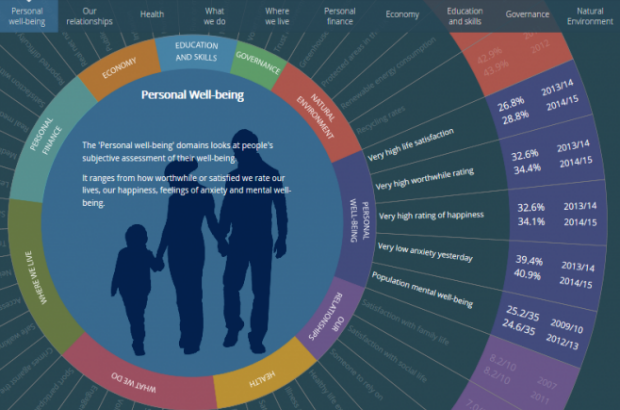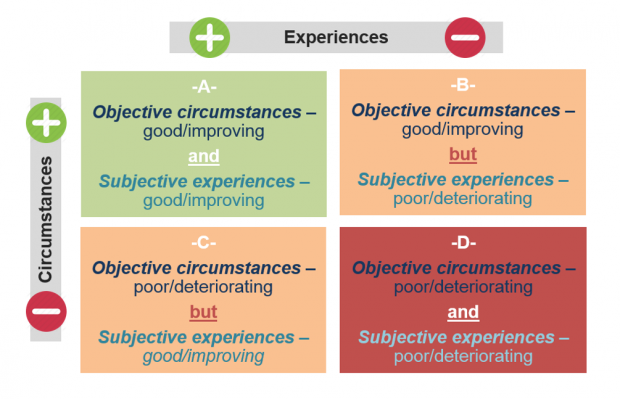
National Well-being Framework – Quality of Life indicators with a difference
In March 2016 the ONS released the latest Life in the UK figures, providing us with a snapshot of how the nation is doing across those areas of life most important to our well-being. There is good news and many areas of our lives are objectively getting better: household income is up, unemployment and crime are falling, and healthy life expectancy is rising. Our personal well-being – how we rate life overall – is also improving. However not all areas of our lives are getting better, and many of the measures assessed as having ‘deteriorated’ relate to our subjective views on how we feel we are doing. For example the proportions of people satisfied with their health, accommodation, household income and leisure time have all fallen over the three-year period since measurement began.
People’s personal ratings about their lives are just as important as data on their background circumstances
The national well-being framework gives us a more complete picture of life in the UK and shines a light on just how important it is to consider both objective and subjective measures of progress. Whilst objective measures are undoubtedly important, subjective measures get to the heart of people’s lived experiences and how they really feel their lives are progressing. We can see from the data that improvements in people’s objective circumstances don’t automatically translate into better subjective experience – for example incomes are up, but satisfaction with income has gone down, and healthy life expectancy has improved while we are collectively less satisfied with our health - and it is in this way that the framework gives us insights we could otherwise miss.
So what does this mean for policy?
There is therefore a strong case for analysts, policy makers and services designers to be interested in and to take account of subjective well-being measures. Indeed, if we think about people’s satisfaction with different aspects of life rather than just their objective circumstances, policy approaches could look quite different. Take crime as an example. If crime is going down and fear of crime is going up, then perhaps reassurance communications might be part of the policy mix. If both are deteriorating, then perhaps more public dialogue and engagement around the priorities and solutions might help. And if all are improving, continuous improvement and celebrating success might be part of the approach.
With this in mind we have put together the simple table below to highlight the different possible combinations of how the indicators are moving. The aim is to provoke thinking about how policy might be different depending on the extent to which people’s objective circumstances and their reported experience agree or disagree.

Tell us your thoughts
Of course to use this you have to collect data (or use existing data) on how people rate their satisfaction with different aspects of their life – work, income, health, housing, education, crime etc. We think the consideration of such indicators is really important so please let us know your thoughts, and whether you find this table useful.
Recent Comments